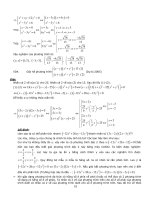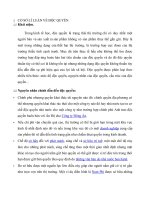ĐỘC QUYỀN GIẢI FULL đề THI (TASK 1 TASK 2) đề THI NGÀY 020319 BY NGOCBACH
Bạn đang xem bản rút gọn của tài liệu. Xem và tải ngay bản đầy đủ của tài liệu tại đây (685.86 KB, 8 trang )
TASK 1
The diagrams illustrate the process of building an igloo
+ Click để tìm hiểu thông tin về khóa học IELTS Package online: />+ Click để tìm hiểu thông tin về khóa offline khai giảng tháng 3: />
Report Plan:
Paraphrase paragraph: diagrams>pictures; illustrate>show;
process>different steps involved; building>constructing
Overall/summary paragraph: number of stages (13); mention the
first and last steps
Paragraph 3: describe steps 1-7: making the shape using snow
Paragraph 4: describe steps 8-13: the steps to finish the
construction
Report:
The pictures show the different steps involved in constructing an igloo.
Overall, there are 13 stages, from finding hard-packed snow to cutting
ventilation holes in the wall and roof of the finished igloo.
Using a snow saw, blocks are cut in hard-packed snow. Large blocks are used
for the base. Next, the edges of the blocks are smoothed and placed to form a
+ Click để tìm hiểu thông tin về khóa học IELTS Package online: />+ Click để tìm hiểu thông tin về khóa offline khai giảng tháng 3: />
circle. Then, an entrance is made by digging a hole under the circular wall.
The last opening on the top is filled by a large block, carefully cut to the exact
size.
After that, snow is thrown on the igloo and packed into all the crevices or
gaps. Inside the igloo, the walls are smoothed by hand. Next, the entrance is
built and the hole is covered with snow blocks. Finally, ventilation holes
which allow air to enter are cut in the walls and roof, and the igloo is finished.
153 words.
+ Click để tìm hiểu thông tin về khóa học IELTS Package online: />+ Click để tìm hiểu thông tin về khóa offline khai giảng tháng 3: />
Task 2: The world of work is changing rapidly and people cannot depend
on the same job or the same conditions of work for life. Discuss the
possible causes for these changes and give your suggestions on how people
should prepare for work in the future.
Essay Plan:
Introduction: agree that work is changing, and say that there are
ways to prepare for these changes.
Paragraph 2: cause for changes: new technology (1)
manufacturing industries – mechanisation (example: product
design) (2) service industries – online shopping/self-service
checkouts (example: order pickers in warehouses replace shop
staff)
Paragraph 3: suggestions (1) employees – flexible work hours or
change location (2) employers – provide training to update
employees skills
Conclusion: technology has resulted in many changes at work, but
people must find ways to adapt.
Essay:
It is true that in the modern workplace, employees can no longer rely on
keeping the same job, or even the same working conditions, for life. While
there are some important reasons for this, there are also ways in which people
might prepare for work in the future.
The most important cause for such changes is the introduction of new
technology. In terms of manufacturing, few workers can expect to have a
steady job. This is an inevitable consequence of mechanisation and, while this
increases labour productivity, it also reduces the need for workers. In product
design, for instance, advances in technology, using computer software
packages, have resulted in the loss of conventional skills of creative drawing.
In service industries, online shopping and self-service supermarket checkouts
result in fewer staff. Order pickers, working alongside robots, in vast
warehouses like Amazon mean fewer assistants in stores to provide personal
service to customers.
+ Click để tìm hiểu thông tin về khóa học IELTS Package online: />+ Click để tìm hiểu thông tin về khóa offline khai giảng tháng 3: />
However, people must prepare for the future world of work. One suggestion
is that workers should be prepared to welcome change by accepting the need
for flexible working hours, or even moving to another area or country to find
employment. Another suggestion is that employers ought to play their part
by providing vocational courses and training at work, so that their employees
can learn new skills. For example, a person serving customers in a store
would also be able to tackle administrative work requiring them to be
computer literate.
In conclusion, although leading-edge technology has changed how people
work, employers and employees must find ways to adapt to such changes.
261 words
Vocabulary from work:
to have a steady job
Meaning: to have a job which you are unlikely to lose, but which is
usually the same routine
Example: Although some people prefer to change jobs, others prefer to
have a steady job and a set daily routine at work.
labour productivity
Meaning: the rate at which a worker, a company or a country produces
goods, and the amount produced, compared with how much time, work
and money is needed to produce them
Example: Wage rates depend on levels of labor productivity.
flexible working hours
Meaning: hours of work that can be changed by agreement between the
employer and the employee
Example: For some employees, flexible working hours are more
important even than a high salary.
Vocabulary from traditional vs modern:
an inevitable consequence
Meaning: certain to happen and unable to be avoided or prevented
+ Click để tìm hiểu thông tin về khóa học IELTS Package online: />+ Click để tìm hiểu thông tin về khóa offline khai giảng tháng 3: />
Example: Some people suppose that the loss of traditional cultures is
an inevitable consequence of technological development.
conventional skills
Meaning: traditional and common skills
Example: Technology can contribute positively to keeping alive
conventional skills and ways of life.
to welcome change
Meaning: to accept change with enthusiasm
Example: While it is important to welcome change, the public must
try to preserve all that is worthwhile from the past.
Vocabulary from technology:
advances in technology
Meaning: the improvement or development in technology
Example: Recent advances in medical technology are making a great
contribution to the search for a cure for Aids.
online shopping
Meaning: shopping while connected to the internet
Example: For people who are physically disabled, or even for people
who are simply very busy, online shopping is convenient and may also
be cheaper.
supermarket checkouts
Meaning: the place where you go to pay for the things that you have
bought
Example: Personal service in shops has been replaced by the
impersonal experience of superstore shopping and queues at
supermarket checkouts.
to be computer literate
Meaning: able to use computers well
Example: In today’s competitive job market, it is essential to be
computer-literate.
leading-edge technology
Meaning: the most advanced position in technology
+ Click để tìm hiểu thông tin về khóa học IELTS Package online: />+ Click để tìm hiểu thông tin về khóa offline khai giảng tháng 3: />
Example: Manufacturers of electronic devices always advertise their
products as having the latest leading-edge/cutting-edge technology.
Vocabulary from education:
vocational courses
Meaning: courses which provide students with the skills and
knowledge that they need to do a particular job
Example: Governments should extend the provision of vocational
courses for those who want to learn a trade, for example as electricians,
plumbers or mechanics.
Other vocabulary:
mechanisation/mechanization [noun]:
Meaning: changes made to a process, so that the work is done by
machines, not people
Example: For many years, we have seen the increasing mechanisation
of farm work.
service industries [noun]:
Meaning: the part of a country’s economy that provides services to
customers
Example: More and more of the workforce are now working in service
industries, such as sales, advertising, banking or tourism.
order pickers [noun]:
Meaning: people used to pick goods from storage and package or
deliver them for customers
Example: John and Mary work as order pickers for Nike in the large
warehouse outside the city.
to tackle [verb]:
Meaning: to make a determined effort to deal with a difficult problem
or situation
Example: The climbers are determined to tackle the highest mountain
in the world this year.
+ Click để tìm hiểu thông tin về khóa học IELTS Package online: />+ Click để tìm hiểu thông tin về khóa offline khai giảng tháng 3: />
+ Click để tìm hiểu thông tin về khóa học IELTS Package online: />+ Click để tìm hiểu thông tin về khóa offline khai giảng tháng 3: />









